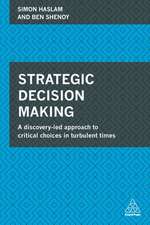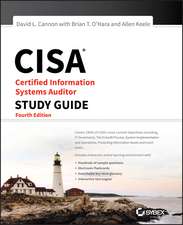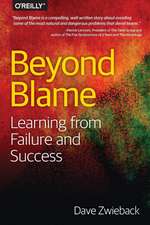Decision-Making for a Sustainable Environment: A Systemic Approach: Social Environmental Sustainability
Autor Chris Maseren Limba Engleză Hardback – 26 iul 2012
A New Paradigm for Environmental Decision Making
Based on the author’s more than 45 years of research and broad, international experience, this book guides policy makers and managers to work with—rather than within—theoretical and methodological frameworks to achieve multidimensional and multilayered policy decisions. It discusses systemic thinking as a rational, viable alternative to competitive, materialistic, and symptomatic decision making.
Insights, Approaches, and Examples for Leadership
Organized into three parts, the book begins by describing the inviolable biophysical principles that define the limitations of human choices. The second part examines in depth why the conventional command-and-control form of decision making tends to become dysfunctional and fails. It also explains how to break the cycle of such behavior. A case study by Jessica K. La Porte explores the challenges of creating a program of environmentally sustainable decision making. The third part of the book explores what it takes to be a psychologically mature decision maker.
A Peaceful Path toward Social-Environmental Sustainability for All Generations
Proposing new ways of thinking and problem solving, this book provides readers with the ideas, language, approaches, and examples to move toward genuine social-environmental sustainability. It offers counsel on how to be a psychologically mature trustee of planet Earth and leave a more viable legacy for future generations.
| Toate formatele și edițiile | Preț | Express |
|---|---|---|
| Paperback (1) | 469.34 lei 6-8 săpt. | |
| CRC Press – 10 dec 2019 | 469.34 lei 6-8 săpt. | |
| Hardback (1) | 706.28 lei 6-8 săpt. | |
| CRC Press – 26 iul 2012 | 706.28 lei 6-8 săpt. |
Preț: 706.28 lei
Preț vechi: 861.33 lei
-18% Nou
Puncte Express: 1059
Preț estimativ în valută:
135.18€ • 140.59$ • 113.28£
135.18€ • 140.59$ • 113.28£
Carte tipărită la comandă
Livrare economică 13-27 martie
Preluare comenzi: 021 569.72.76
Specificații
ISBN-13: 9781466552166
ISBN-10: 1466552166
Pagini: 304
Ilustrații: 1
Dimensiuni: 156 x 234 x 23 mm
Greutate: 0.61 kg
Ediția:New.
Editura: CRC Press
Colecția CRC Press
Seria Social Environmental Sustainability
ISBN-10: 1466552166
Pagini: 304
Ilustrații: 1
Dimensiuni: 156 x 234 x 23 mm
Greutate: 0.61 kg
Ediția:New.
Editura: CRC Press
Colecția CRC Press
Seria Social Environmental Sustainability
Cuprins
Nature’s Urgent Message to the World’s Decision Makers: The Principles of Biophysical Sustainability. Decision Making and Nature’s Rules of Engagement. When the Decision Making Becomes Self-Serving: The Stages of an Environmental Agency. Dissonance within Duplicity: Sustainability Programs at the Southern Nevada Water Authority, a Case Study. Breaking the Dysfunctional Cycle of Environmental Agency Decision Making. What Makes a Psychologically Mature Decision Maker? The Essence of a Responsible Decision Maker. Coping with the Responsibilities and Pressures of Social-Environmental Decision Making. Giving Children a Voice in Their Future through Shared Decision Making. Afterword. Appendix: Common and Scientific Names of Plants and Animals. Index.
Notă biografică
Chris Maser was trained in zoology and ecology and worked for 25 years as a research scientist in agricultural, coastal, desert, forest, valley grassland, shrub steppe, and subarctic settings in various parts of the world before realizing that science is not designed to answer the vast majority of questions society is asking it to address. Maser gave up active scientific research in 1987 and has since worked to unify scientific knowledge with social values in helping to create sustainable communities and landscapes, part of which entails his facilitating the resolution of social-environmental conflicts. He has contributed to more than 286 publications, including 34 books, mostly dealing with some aspect of social-environmental sustainability. Although he has worked and lectured in Canada, Egypt, France, Germany, Japan, Malaysia, Mexico, Nepal, Slovakia, and Switzerland, he calls Corvallis, Oregon home.
Recenzii
"Decision Making for a Sustainable Environment is a challenging read on a whole range of levels. Deeply personal, deeply reflective, courageous, and atypically altruistic. If you find yourself in self-analysis while reading this book, then you have got the point. ... Not for the faint-hearted, [it] reminds us that humans have a power and responsibility to make wise decisions when it comes to sustaining the natural world that we are part of. The Earth is a complex place made more so by humans. Decision Making for a Sustainable Environment places the role of humans on the Earth in the right context: be humble, be respectful, and be aware."
—Dr. Andrew W. Claridge, Senior Research Scientist, NSW National Parks and Wildlife Service, Australia
"[This book] provides ideas, language, approaches, and examples to move a place of employment, a government, or a community toward what Chris Maser calls ‘psychological maturity for the social-environmental sake of all generations.’ ... I am more ready to effect change in decision makers because of the lessons and wisdom and approach that Chris offers in this book."
—From the foreword by D. Alexander Wait, Missouri State University, USA
—Dr. Andrew W. Claridge, Senior Research Scientist, NSW National Parks and Wildlife Service, Australia
"[This book] provides ideas, language, approaches, and examples to move a place of employment, a government, or a community toward what Chris Maser calls ‘psychological maturity for the social-environmental sake of all generations.’ ... I am more ready to effect change in decision makers because of the lessons and wisdom and approach that Chris offers in this book."
—From the foreword by D. Alexander Wait, Missouri State University, USA
Descriere
Increasingly, social-environmental decision making is like playing a multidimensional game of chess. Facing complex interactions between the atmosphere, the litho-hydrosphere, and the biosphere, policy makers and managers need a systemic approach to decision making. Replacing the dysfunctional, symptomatic thinking that has plunged the world into environmental crises, the new paradigm of systemic decision making fosters social-environmental sustainability. Based on the author’s more than 45 years of research and international experience, it guides readers to work with, rather than within, theoretical and methodological frameworks to achieve multidimensional and multilayered policy decisions.





















